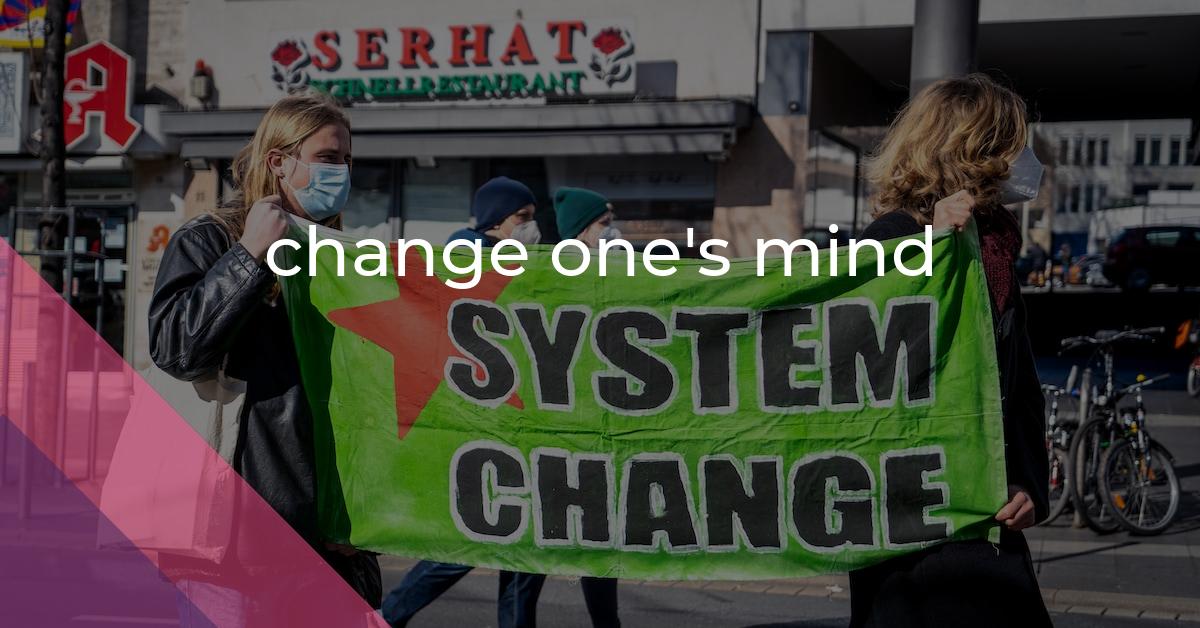change one’s mind: Idiom Meaning and Origin
What does ‘change one's mind’ mean?
The idiom "change one's mind" means to alter or revise one's opinion or decision on a certain matter.

Idiom Explorer
Decoding Shifting Thoughts
The meaning of "change someone's mind" is very similar to that of "change one's mind." It refers to the act of persuading or convincing someone to alter their opinion or decision. It involves presenting new information, arguments, or perspectives in a compelling way that causes the person to reconsider their initial stance. This idiom is often used in debates, discussions, and negotiations, where one party attempts to change the other's viewpoint.
An example of "change someone's mind" can be seen in a political campaign. Let's say a candidate is trying to win over undecided voters. They might use persuasive speeches, evidence, and personal anecdotes to change the minds of these voters and convince them to support their campaign. In this case, the candidate is using the idiom "change someone's mind" to describe their objective of swaying the opinions of undecided individuals.
"change one's tune" is another idiom that is related to "change one's mind." It is used to describe a significant shift in someone's attitude, behavior, or position on a particular matter. The idiom implies that the person has completely changed their stance, often in a way that contradicts their previous beliefs or actions.
An example of "change one's tune" can be seen in a friendship that has experienced a falling out. Let's say two friends had an argument and stopped speaking to each other. After some time, one of the friends realizes their mistake and wants to mend the friendship. They reach out to the other friend, apologizing and expressing their desire to reconcile. In this scenario, the friend who initially held a grudge has changed their tune and is now showing remorse and seeking forgiveness.
"make up one's mind" is yet another idiom that is closely related to "change one's mind." It refers to the act of finally reaching a decision or forming an opinion after a period of contemplation or uncertainty. The idiom suggests that the person has resolved any inner conflicts or doubts and has firmly decided on a course of action.
An example of "make up one's mind" can be seen in a person trying to choose between two job offers. Let's say this person has been weighing the pros and cons of each offer for some time. After careful consideration and evaluation, they finally make up their mind and decide which job to accept. In this case, the person has gone through a process of deliberation and ultimately arrived at a definitive choice.
"go over to the majority" is an idiom that relates to group dynamics and conforming to the opinions of the majority. It refers to the act of changing one's position or viewpoint to align with the prevailing sentiment or popular opinion.
An example of "go over to the majority" can be seen in a group discussion where a decision needs to be made. Let's say the majority of the group is in favor of a particular option, but a few individuals initially held a different opinion. After hearing the arguments and seeing the overwhelming support for the majority opinion, these individuals might go over to the majority and change their stance accordingly. In this scenario, they are using the idiom "go over to the majority" to describe their shift in position to align with the prevailing sentiment of the group.
The idiom "change one's mind" is a commonly used expression that describes a shift in a person's opinion or decision. Its related idioms, such as "change someone's mind," "change one's tune," "make up one's mind," and "go over to the majority," further expand on the concept of changing one's perspective, attitude, or stance. These idiomatic expressions highlight the ability to adapt, reconsider, and align oneself with new information or prevailing sentiments. In everyday life, the use of these idioms allows for clearer communication and understanding when discussing the intricacies of opinions, decisions, and shifting attitudes.
Example usage
Examples of how the idiom "change one's mind" can be used in a sentence:
- He was planning to go to the party, but he changed his mind at the last minute.
- I was going to order the fish, but I changed my mind and went for the chicken instead.
- After much consideration, she changed her mind and decided to take the job offer.
More "decision" idioms



